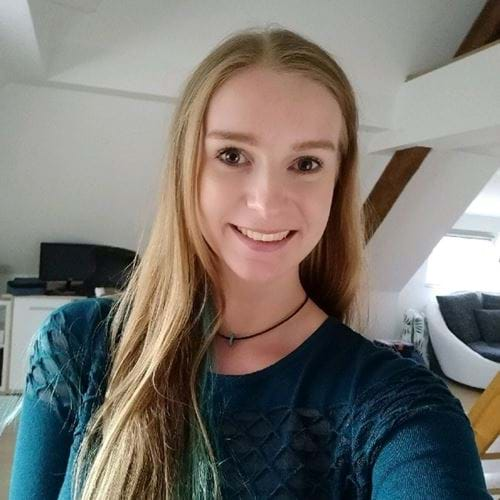Pause carousel
Play carousel

"Abertay’s Ethical Hacking course is well-known because it covers everything you could need for working in the industry."Paulina Ruh | Ankura | Digital Forensic Analyst and Incident Responder
Why did you choose to study at Abertay?
I loved the idea of doing my masters degree in one year and additionally have the oppportunity to study in a different country. Abertay offers a wide range of courses and especially the Ethical Hacking course is well-known, because it covers everything you could need for working in the industry. After doing some research I quickly decided to apply, because it seemed like the best fitting course overall. When doing a masters after already doing a bachelors in the area of cyber security, the problem is usually that there are no new contents to learn, because most universities focus on being broad so many people can apply. Abertay has a really in-depth curriculum that had new topics for every student, even if they already have a background within forensics for example. Moreover, everyone at Abertay during the application process was just nice and helpful, which gave me the feeling to be welcomed and wanted, which is important if you choose to move to a completely different country for a long amount of time. In the end I never regretted my decision and would go back if I had to choose again.
What did you most enjoy about your time at Abertay?
Even though I was in Scotland during Covid and was hit with regulations all over, the university still managed to offer us the opportunity to come into the building once a week to meet with professors and other students. All of the staff made sure to really include the students when studying from home, so it was easy to make friends despite not being able to meet up regularly. I would love to go back to Abertay and get the full experience with pub crawls, late night parties and meeting people from all over the world.
Favourite memory from your time at Abertay?
I still remember the first time I walked into the main hall from my lecture building and feeling like I stepped foot into the great hall from Harry Potter. Dundee and especially Abertay really have the vibe of the movies and because I'm a big fan it's still a dear memory to think back and imagine that I was a student at Hogwarts at some point.
How did you find the transition between University and the real world of work?
The transition was really easy, especially because Abertay offers support. Even though I didn't need it because I already had a job offer, it was nice to see that there would be help if needed. I applied for one job while still writing my masters disseration and they invited me over to do a two-day assessment center. It basically showcased a hacking attack in a network and it was my duty to figure out what had happened. Even though I was nervous, I knew I had the knowledge to pass the test and was hired on the spot. The forensics and ethical hacking courses from Abertay really came into play and it helped that many assignments were based on writing reports, which made it easier to create an assessment report which I could hand to the employer to show what I've done.
Tell us a wee bit about your journey to this point in your career since leaving Abertay.
After leaving Abertay, I was hired by a small company in Germany as a forensic analyst. Because I was the first person in this non-existing department, it was my task to set up a working environment. This included developing processes, finding fitting software tools, order necessary hardware and in general start working on forensic cases. I was working there for 6 months until I got an offer from a big consulting house with international presence. I joined the consulting house in April 2022 and been working there as a forensic specialist and incident responder. The job is really versatile, because I'm able to work most of the time from home, but there are also cases where I'm on-site at the client for a few weeks and living in hotels. I'm working together with an international team from the UK, Hong Kong and the US and we often meet each other on different projects, which is really nice because it helped me to make friends in all parts of the world.
What are your future aspirations?
I want to keep working in the incident response and forensics area, but there's a good chance I might also switch to cyber psychology. It's a topic that fascinates me and I would love to use scientific approaches to minimize cyber attacks that origin from human error and behaviour.
Do you have any advice for prospective students thinking about getting into your profession?
Keep going and trust the process. Cyber Security is a fast changing environment and sometimes it might seems like you can't keep up. And that's okay, as long as you try to keep a foot in the game. I always have the feeling of falling behind and not being able to support myself against the male dominated environment, but then I always tell myself that I made it so far, there must be something I'm doing right and this helps me to keep going. It might be difficult in the beginning to find your niche in the industry, but as soon as you built a small network, it's going to grow and you can make yourself comfortable. Forensics and especially Incident Response is a topic that has great value to the world and all industries, which makes you a person who is closely watched. But don't be afraid, it's going to be fine and you'll have the best years of your life meeting the most amazing people.